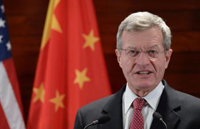Co-worker: Political adviser has emigrated
By An Baijie (China Daily) Updated: 2012-11-26 22:52A political adviser known for expressing her patriotism and opposition to emigration has become a citizen of a foreign country, her colleague confirmed on Monday.
Zhang Lan, 54, chairwoman of the South Beauty restaurant chain and a member of the Beijing Chaoyang District Committee of the Chinese People's Political Consultative Conference, emigrated overseas two months ago, a senior manager at the company said.
Her reason for emigrating was to make the company's brand more international — although it remains unclear which country she went to — said the manager, who declined to give his name.
Du Wei, a spokeswoman for South Beauty Group, would not confirm whether Zhang had emigrated when contacted by China Daily on Monday.
"It's a private issue," she said, adding that Zhang is currently receiving medical treatment in China.
Her emigration was initially exposed by Chaoyang District People's Court, which tried to summon her in September in a lawsuit over an economic dispute.
The court was unable to find her and police said her hukou — household registration — had been canceled on Sept 17.
Chinese citizens' hukou can be canceled only if they join the army, emigrate or die.
Zhang famously expressed her opposition to emigration on a debate show on Hong Kong's Phoenix TV in 2010, saying that wealthy Chinese who emigrate have taken considerable wealth out of China with them.
"I'm Chinese and the blood in my body is Chinese," she said, adding that she had refused an invitation from Canada to immigrate there in 1991, after she worked there for years. "I will be loyal to my country because I'm a Chinese," she said.
An official in the general office of the Chaoyang district committee of the CPPCC said on Monday that Zhang's status as a political adviser remains unchanged.
"She didn't report to the consultative conference the fact that her hukou has been canceled," said the official on condition of anonymity. "We are still trying to contact her to confirm with her the change of nationality."
There are no written rules that say foreigners cannot be chosen as China's political advisers, he said.
However, Zhao Qizheng, director of the foreign affairs committee of the National Committee of the CPPCC, China's top advisory body, said in March that foreigners cannot become CPPCC members.
When asked whether there were some CPPCC members who had emigrated, Zhao said he had checked on those members who were said to have emigrated and found that none of them had.
Zhang's emigration has been a hot topic online, with many netizens saying her status as a political adviser conflicts with her being a foreign national.
Du Bin, a deputy to the National People's Congress and department head at the research institute under Baosteel Group Corp in Shanghai, expressed his opposition toward Zhang's emigration on Monday.
"It's inevitable that Zhang will take much wealth away since she has emigrated, and we should support the other entrepreneurs who make contributions to our home country," he said. "I will never have dinner at South Beauty in the future and I hope other people will also boycott it."
Mao Shoulong, a professor of public administration research at Renmin University of China, said that CPPCC membership should be granted to both Chinese and foreigners.
"In ancient times, some foreigners were named as Chinese government officials," he said. "China is becoming more international nowadays, and it's not a threat to State interests to enroll foreigners into the political advisory body."
The CPPCC, established in 1949, serves as a key mechanism for multi-party cooperation and political consultation under the leadership of the Communist Party of China.
Members represent a wide variety of political and professional backgrounds. These advisers, divided into specialized committees, are consulted and are entitled to make proposals to the government.
Unlike NPC deputies, who are elected by the people, CPPCC members are recommended by different political and professional organizations, and chosen by the Standing Committee of the CPPCC.
- South Beauty to go public in HK
- Celebrate Halloween at South Beauty
- South Beauty
- South Beauty works for listing to fuel expansion
- South Beauty works for listing to fuel expansion
- Zhang Lan, Chairwoman of South Beauty Co Ltd
- South Beauty gets suitor from Beijing
- Catering: South Beauty gets suitor from Beijing
- South Beauty gets suitor from Beijing
- Chinese economy can conquer challenges: Li
- Elderly bear brunt of tornado's fury
- Launch center drives Hainan tourism
- Joint boost pledged for world peace
- China to recruit lawyers, legal experts to draft bills
- Lack of tents, shelter for Funing tornado victims
- Rocket takes China closer to space station
- What you need to know about Jiangsu's deadly tornado
- China faces challenges in tornado forecast: weather authority
- Ruling may 'open Pandora's box'










